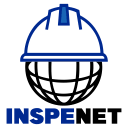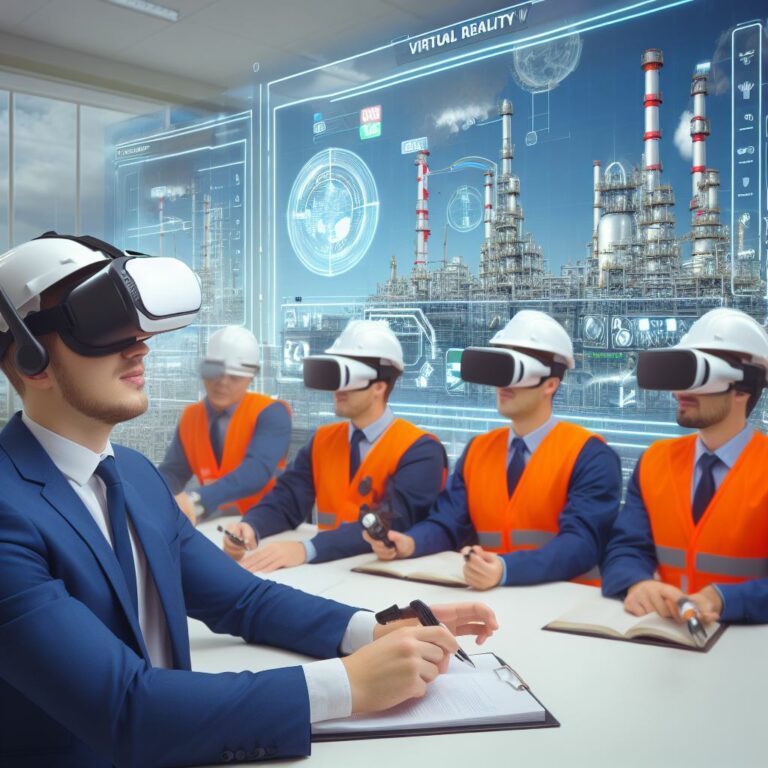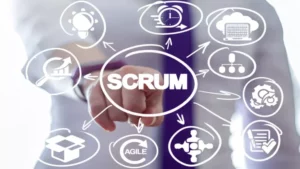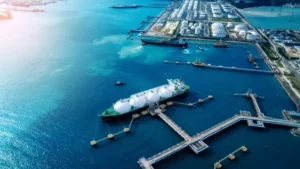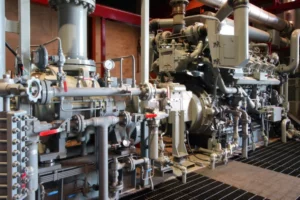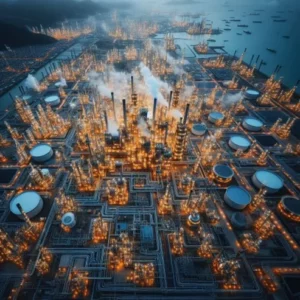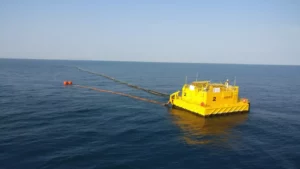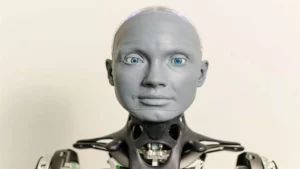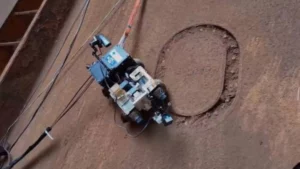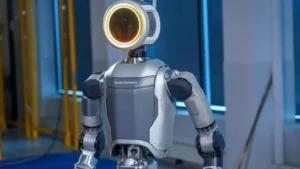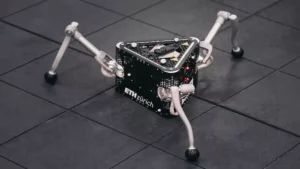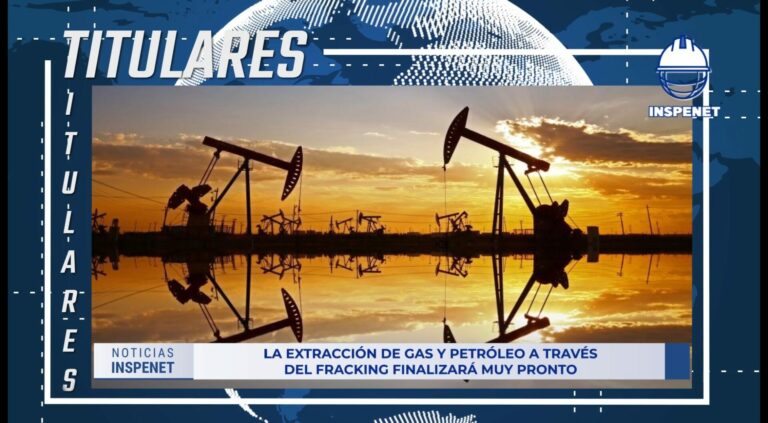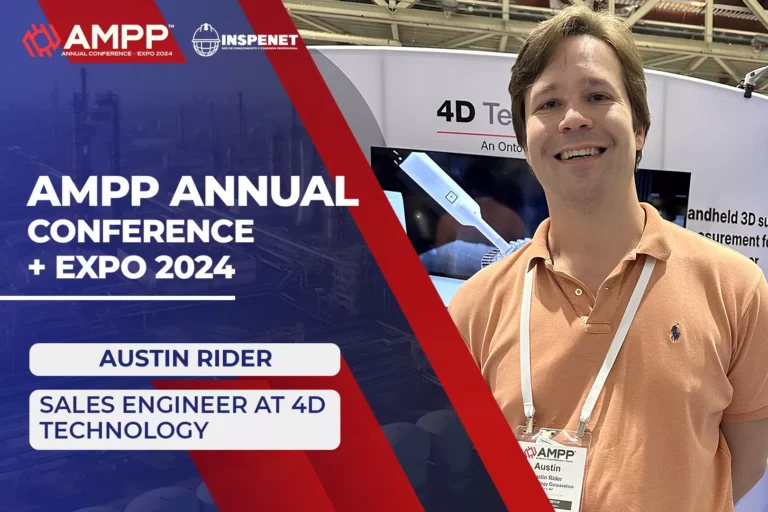Author Ing. Jesús V, November 23, 2023.
Introduction
Currently and with the advancement of new technologies, Virtual Reality (VR) has become a valuable platform implemented in training processes, especially for inspectors who work in industrial environments. Industrial inspection is a procedure that allows evaluating the optimal functioning of assets, as well as compliance with the regulations that apply to each specific case.
To achieve an evaluation efficiently, it is essential to have trained professionals who can carry out this work. Therefore, it is essential to have adequate training to ensure the necessary competence and skill in this area.
Industries are experiencing a change in the way they train their workers thanks to virtual reality tools. These immersive technologies are transforming the study and analysis of these environments, benefiting various fields, such as the energy industry.
From its integration into the industry to its future projections, we will explore its most notable aspects, such as the benefits, the crucial importance of training and the challenges inherent to this innovative tool.
The impact of training on industrial inspection
Carrying out the industrial inspection procedure is generally entrusted to properly trained and certified workers, who use various specific techniques and technologies to carry out said evaluation. Correct training of inspection personnel provides industries with the following advantages:
Quality guarantee: In a market where competitiveness is everything, the constant quality of products becomes imperative 1 . Inspection training gives professionals the necessary skills to detect defects and deviations in key processes in different industries. This proactive approach enables the development of corrective actions, preventing production failures.
- Risk Mitigation: Training is not limited to visual assessment; trains inspectors to identify hazards not visible to an inexperienced observer. By identifying and addressing these issues at an early stage, industries can minimize risks and prevent incidents.
- Cost reduction: Proper training focuses on efficiency, without compromising accuracy; Therefore, trained inspectors can carry out evaluations quickly and accurately, minimizing downtime and production delays. This efficiency translates into cost savings by reducing operational disruptions, preventing the need for extensive rework, and avoiding costly product recalls.
- Regulatory compliance: Industries operate in a complex environment of regulations and standards that address safety, health and environmental impact. Appropriate training ensures that professionals are familiar with these regulations, allowing them to carry out inspections that comply with legal requirements. Failure to comply with these rules may result in fines, litigation, and damage to the organization’s reputation.
- Protection of corporate identity: For organizations, it is necessary to establish a positive reputation based on the quality and reliability of their services. Training employees allows customer trust to be strengthened by ensuring that assets have undergone thorough inspection and meet rigorous standards, generating loyalty, repeat business and referrals.
Profits
Training under realistic simulations
It is a simulation that is based on the ability to generate digital twin replicas that accurately reproduce the physical environment of inspection or maintenance operations (see figure 1). These detailed three-dimensional representations offer realistic simulations, allowing professionals to virtually immerse themselves in life-like operating environments. Its technical approach provides inspectors with an immersive and highly accurate training experience.
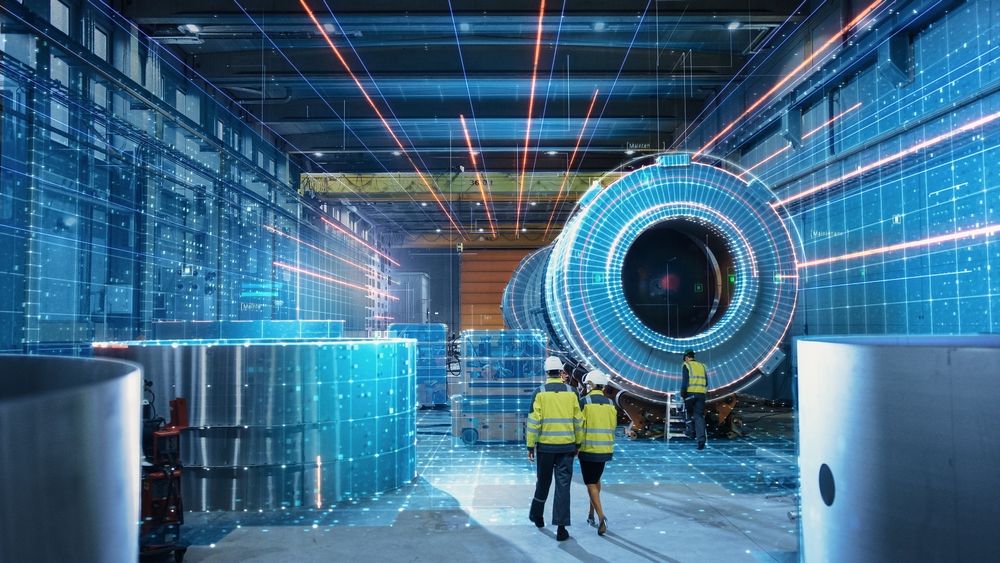
Reduction of costs and risks in training
Its implementation allows organizations to reduce costs associated with training in real environments 2 , while minimizing the risks of accidents and equipment damage. This is a flexible and scalable alternative, expanding its accessibility to a greater number of inspectors. Therefore, it is a technology that is presented as a key tool to optimize efficiency and safety in inspection processes.
Real-time performance evaluation
Development through this technological alternative provides a unique advantage by offering real-time information on its performance. By recording actions and providing comprehensive analysis, this system allows trainers to identify areas for improvement, as well as monitor progress in detail. This feature is especially beneficial for those carrying out complex inspection procedures, allowing them to learn and correct errors in a secure virtual environment.
Improve skills with efficient collaboration
Virtual training stands out for simulating different real-world scenarios to execute practical exercises 3 . This approach provides a unique opportunity for different team members to converge in a shared virtual environment. Effective collaboration, practice and immediate evaluation become possible in this shared space, optimizing learning and the practical application of knowledge.
Optimizing Skill Development
This advanced technology streamlines skill development, resulting in greater business productivity. Immersing inspectors in an immersive virtual environment allows them to quickly acquire new skills and retain knowledge more efficiently. Additionally, it not only improves training efficiency, but also allows for the formation of a better trained and more competent workforce.
Importance of training through virtual reality
Traditional training methods, although they offer valuable information and approaches, use resources that today can be seen as obsolete; resulting in inspectors having learning difficulties and not having optimal capabilities to carry out appropriate inspections.
Virtual reality, as a means of training, is a valuable alternative that aims to break down the barriers that prevent obtaining an appropriate education.
Thanks to their immersive experiences, inspectors will be able to achieve successful learning not only with visual aids, but also with practical and immersive approaches. These same experiences present situations that are really difficult or almost impossible to replicate in conventional training, and in this way, the trained team will have a greater range of learning while minimizing possible injuries due to errors in the field.
In short, the great importance of training through virtual reality lies in the fact that inspectors can gain increasingly deeper knowledge in a safer and more efficient work environment. Giving way to the refinement of skills and the improvement of performance in the work field.
Implementation case
In 2022, the Ministry of Labor of Qatar together with the International Labor Organization 4 developed a virtual reality training course for labor inspection (see figure 2). This project presented an immersive experience in which workers, through simulations of different sites and scenarios, identified irregularities and answered questions about common workplace accidents. The immersive teaching system and its gamified approach proved to be powerful tools, raising students’ knowledge retention.
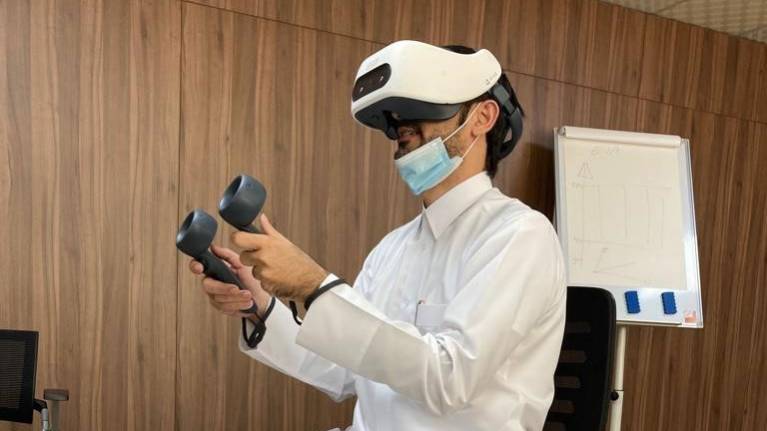
This technological collaboration came from reinforcing Qatar’s commitment to occupational health and safety, marking a milestone in the training of inspectors through a safe and advanced method.
Challenges and considerations
Below are some very important challenges:
- Implementation costs: Adopting virtual reality technologies can involve significant investments. However, in the long term, the benefits in terms of efficiency, safety and quality of learning may outweigh the value of the initial investment.
- Resistance to change: Despite the projected value of this educational concept, within certain organizations there may still be a preference for traditional methods, which ends up hindering its adoption. However, awareness of the benefits can overcome this resistance.
- Maintenance and technological structure: As virtual reality technologies are constantly evolving, organizations must be prepared to perform regular updates and maintenance. At the same time, external equipment and an optimal connection will be needed to properly use this studio system.
The future of training
As virtual reality continues to evolve, it is expected to play an even more prominent role in the development of inspectors in industrial settings. Some examples of future innovation in training are:
- Augmented Virtual Reality: The combination of virtual and augmented reality promises an even more immersive and personalized training experience. They will be able to interact with information in real time while exploring simulated environments.
- Integrated artificial intelligence: Incorporating artificial intelligence into simulations will allow the creation of more dynamic and adaptive scenarios. This will improve employees’ ability to deal with complex and novel situations in industrial environments.
- Remote collaboration: It’s just a matter of time before teams from different locations work together on simulations. Remote learning spaces offer an improvement in educational efficiency and will encourage the exchange of knowledge between professionals from different parts of the world.
Conclusions
Virtual reality has arrived to transform the way we train inspectors in industrial environments. Its ability to deliver immersive and safe experiences is revolutionizing the efficiency and effectiveness of training. As organizations overcome challenges and adopt these technologies, they are preparing for a future where training workers in the industry is important.
Although implementation faces challenges such as upfront costs and resistance to change, the future of training looks even brighter. Augmented virtual reality, the integration of artificial intelligence and remote collaboration outline a path towards increasingly advanced and efficient education in industrial inspection. This technological advance will drive not only a change in training, but a qualitative leap towards excellence in inspection work.
References
- SMS LABS Private Limited. (sf). The Importance of Proper Inspection Training in Industry . Retrieved November 16, 2023, from https://medium.com/@ayush.indoage/the-importance-of-proper-inspection-training-in-industry-8ad41574cc6b
- InfyVR (sf). VIRTUAL REALITY INSPECTION TRAINING . Retrieved November 16, 2023, from https://blog.infivr.com/virtual-reality-inspection-training-infivr/
- InfyVR (sf). ADVANTAGES OF VIRTUAL REALITY TRAINING . Retrieved November 16, 2023, from https://blog.infivr.com/benefits-of-vr-training-infivr/
- International Training Center of the International Labor Organization (2022, September 21). Qatar and ILO launch virtual reality training course for labor inspectors . Retrieved November 17, 2023, from https://www.itcilo.org/fr/node/2849#:~:text=During %20the% 20VR %20experience% 2C %20which,remember% 20and %20internalize% 20new%20knowledge .


